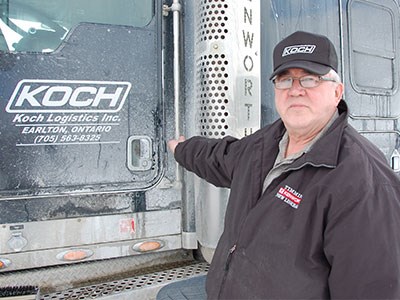The sprawling grain elevator complex of Koch Farms along Highway 11, near Earlton, is an unmistakable sight.
For Norm Koch, president of Koch Farms and Koch Logistics, diversification has been the key in growing the successful family-run venture.
With a peak summertime workforce of between 30 and 35 employees, Norm shares the load with his sons, Chad, who handles the field work and equipment, and Rob, who’s in charge of the elevators and helps on the logistics side.
Two daughters-in-law work in the office with his wife, Gwen.
The operation includes elevator capacity for 1.8 million bushels and a farm equipment fleet of several John Deere combines and fat-wheeled Case IH Steiger tractors.
On the highway, they run a highway fleet of 15 transport trucks, mostly Kenworths, hauling B-trains of grain for themselves or other customers.
For a two- or three-year spell the trucks ran on bio-diesel – buying loads of B5 and B10 blend from a distributor near Stratford – until the price of fuel began to plunge and he switched back to straight diesel.
The Koch family migrated to the area from New Hamburg in 1986. Norm had worked in the Claybelt since the early 1970s, building and repairing farm silos.
He arrived to work as a contractor, not with the intent of buying property. But the local economy had tanked and the price of farm land was “way, way too cheap” compared with land in southern Ontario, which ran $3,000 to $4,000 an acre.
“Some of the first farms here we bought for less than $300 an acre.”
Through some wheeling and dealing, he acquired property and began custom farming for others.
“We just kept going, buying and selling grain.”
The family spread has grown to 11,000 acres in Cochrane, Temiskaming and parts of western Quebec; some owned, some rented, mainly growing cash crops like oats and wheat with some corn and soybean.
“When I first moved up I was talking with farmers about getting the price of land up. Of course, the farmer that wants to buy the neighbour’s farm doesn’t want to hear that.”
But at the same time, the depreciated value of the land made it difficult for farmers to borrow for tile drainage.
Gradually, farmland along the Highway 11 corridor is being repopulated by Mennonites and Amish, who have sold their properties in Waterloo County, and clustered in small centres like Charleton.
“Once a few determine that an area is okay and they can make a living here, other families move in,” said Koch, who was raised in a Mennonite family in southwestern Ontario.
In an effort to promote greater economic diversification, Koch is a staunch supporter of maintaining the New Liskeard Agricultural Research Station. The future of the money-losing 275-hectare complex seemed in jeopardy until the newly-formed Northern Ontario Farm Innovation Alliance (NOFIA) stepped up to preserve it.
“It’s not closed, and it’s not going to close,” said Koch, who is NOFIA’s president, “but we understand that research just for the sake of research cannot carry on.”
The province granted a brief moratorium on closing the station, which is run under a partnership with the agriculture ministry and the University of Guelph, while NOFIA carried out a new business plan, which it has filed.
“With agriculture expanding in the North it would have an awful black eye to have our station close.”
Koch said activity at the research farm has to be focussed on profitability, “whether it’s cropping, cattle or growing trees, something that puts money into the producer’s pocket. It’s got to make sense and make dollars for the farmers and has to include all of Northern Ontario; it’s not just Temiskaming.”
Koch said most farmers weren’t involved in the station’s research on a regular basis. “It was like a rowboat without the oars. If the province and Guelph want to keep it running they’re going to need input from the region.”
Instead of focusing on pure research, he wonders if the station should concentrate on technology transfer. Are there value-added opportunities such as a seed oil-crushing operation, a flour mill or the establishment of greenhouses?
“Everybody talks about the 100-mile diet for food. It’s kind of hard in talking fruits and vegetables when half of your year, you’re under snow.
“Our hope is that the station remains feasible,” he said, but the restructured model of the station should consider a downsizing the infrastructure. Some buildings in the complex remain empty or are leased by tenants like Service Ontario and the Ontario Provincial Police.




